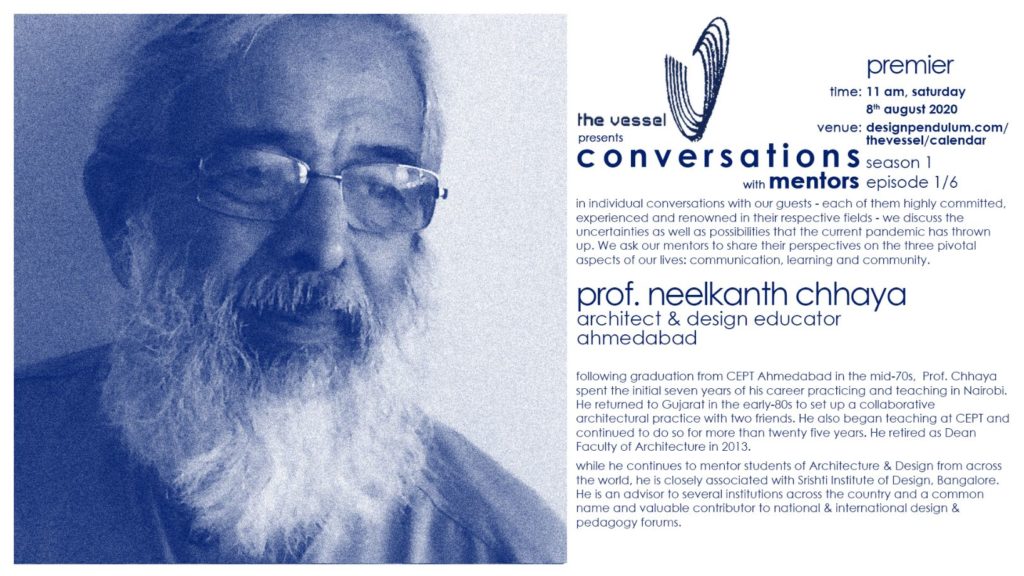Prof. Neelkanth Chhaya
conversations with mentors

episode 1 of 6
In individual conversations with our guests – each of them highly committed, experienced and renowned in their respective fields – we discuss the uncertainties as well as possibilities that the current pandemic has thrown up. We ask our mentors to share their perspectives on the three pivotal aspects of our lives: communication, learning and community.
Following graduation from CEPT Ahmedabad in the mid-70s, Prof. Chhaya spent the initial seven years of his career practicing and teaching in Nairobi. He returned to Gujarat in the early-80s to set up a collaborative architectural practice with two friends. He also began teaching at CEPT and continued to do so for more three decades. He retired as Dean Faculty of Architecture in 2013.
While he continues to mentor students of Architecture & Design from across the world, he is closely associated with Srishti Institute of Design, Bangalore.
He is an advisor to several institutions across the country and a common name and valuable contributor to national & international design & pedagogy forums.
trailers
about the series
From material testing of ideas to embodied experiences and learning, to meaningful conversations and relationships, to finding and nurturing close-knit communities, these are the high-risk thrills that we chase.
The fear of the infectious disease, the scientific advice of maintaining socio-physical distance and the mis-orchestrated and mis-played lockdown have fallen on our adventurism like gigantic clouds of lead. Most, if not all, of what we know about learning and community now lies pinned down, wriggling, unable to move the way it used to. Fortunately though, we have our breath, bodies and loved ones to care for and tell us that we are alive and good.
While the evolutionary power of adaptability is firing away in all directions to find a conducive response to help us survive this threat, one of its inadvertent attempts is to rush to a sense of normalcy – doing things as we are used to doing them.
Although this may require extraordinary effort in framework, all three – the extraordinariness, the effort and the framework – are almost always considered insignificant; since even their acknowledgement is an admission of the prevalent threat and the fact that things are not normal. The prompt shift to digital platforms, be it schools, colleges, offices or businesses, is a case in point. Although the PR and marketing machineries’ cost saving on wine and tikka is understandable, the apparent opportunism in the incessant torrent of webinar announcements is unbearable. Yes it is good to keep going, but perhaps not so in unprecedented circumstances. Crises, whether presumed by an individual anxious mind, or perceived as clear and present by the collective intelligence, demands attention and care. Continuing to operate without pause, acknowledgement or conversation, betrays a society and mind that are in a state of perpetual crisis. As a popular post on social media states: “The virus didn’t break the system; it only exposed a broken system.“
Fortunately though, we have our breath, body & loved ones and we will walk home. Perhaps trying to prove that it is not humanity that is in crisis; instead, its economic model – our idea of “making a living“, the little worth that we place on life – that needs radical rethinking and complete reconstruction. Perhaps if we were to pause and breathe, we would see not only that the system has been broken for long, rather intentionally, but also that the system is supposed to serve us and not the other way around; that while we are worrying our days and sleep away in making a living, life already is… here and now… To keep them from being misplaced in rhetoric, we turn to our teachers. The opening series of Conversations at The Vessel is with our beloved teachers – mentors who have contributed to our emotional and spiritual upbringing, while bearing significant influence on our intellectual growth.

 malkum
malkum